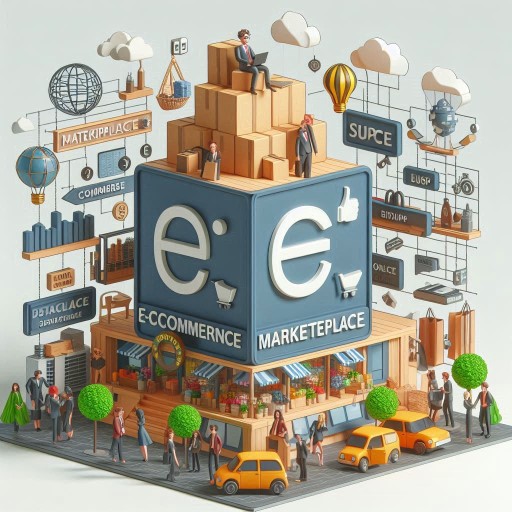TechTrend4u – Digital transformation has changed the way businesses operate, especially when it comes to marketing and sales. With the increasing use of the internet and digital devices, E-commerce and Digital Marketing are two key pillars that enable businesses to achieve success in the online world. This article will discuss how E-commerce and Digital Marketing work, their benefits, as well as some examples of successful implementations.

What is E-commerce?
E-commerce, or electronic commerce, is the process of buying and selling products or services online through a digital platform. E-commerce allows businesses to reach a wider market without having to have a physical presence. Different types of E-commerce include direct-to-consumer sales (B2C), business-to-business sales (B2B), and consumer-to-consumer sales (C2C).
Benefits of E-commerce
E-commerce offers various benefits to businesses, including:
- Access to Global Markets: With E-commerce, businesses can sell their products to customers all over the world without geographical boundaries.
- Low Operating Costs: Not requiring a physical store means savings on rent, utilities, and labor costs. This allows businesses to sell their products at better margins.
- Ease in Tracking and Analyzing Data: E-commerce allows businesses to track customer behavior in real-time, understand their preferences, and adjust marketing strategies according to such data.
- Ease of Transactions: With various online payment options, customers can transact easily and securely, increasing sales conversions.
Example of E-commerce Implementation
One example of a successful E-commerce implementation is Tokopedia in Indonesia. As a leading marketplace platform, Tokopedia has helped millions of MSMEs and large businesses to sell their products online. With various features such as digital payments, integrated shipping, and online promotions, Tokopedia makes it easy for sellers and buyers to transact efficiently.
Read more: Ride-Sharing: Transforming Travel in the Sharing Economy
What is Digital Marketing?
Digital Marketing is a series of marketing strategies that use the internet and digital tools to promote products or services. Digital Marketing includes various tactics such as search engine optimization (SEO), social media marketing, content marketing, paid advertising, and email marketing.
Benefits of Digital Marketing
Digital marketing offers a number of important benefits, including:
- More Precise Targeting: With digital marketing, businesses can target specific audiences based on demographics, interests, and online behavior, ensuring that marketing messages reach the right people.
- Accurate Performance Measurement: Digital Marketing allows businesses to track the performance of their campaigns in real-time, measuring metrics such as clicks, conversions, and ROI, and making the necessary adjustments to improve results.
- Direct Interaction with Customers: Through social media and other digital channels, businesses can interact directly with their customers, building stronger relationships and increasing loyalty.
- Cost Efficiency: Compared to traditional marketing, Digital Marketing is often more cost-effective and offers a higher return on investment, especially for small and medium-sized businesses.
Example of Digital Marketing Implementation
Gojek is an example of a company that successfully utilizes Digital Marketing to expand its customer base. With strong social media campaigns, engaging content, and the use of influencers to promote their services, Gojek has managed to become one of the most recognized on-demand apps in Indonesia. Gojek also uses customer data to customize offers and promotions, ensuring high relevance and increasing conversions.
Read more: Digital Culture: The Key to Successful Digital Transformation
The Synergy Between E-commerce and Digital Marketing
E-commerce and Digital Marketing complement each other. By combining the two, businesses can create a powerful strategy to attract, engage, and convert customers. Here are some ways in which the two can work together:
Search Engine Optimization (SEO) for E-commerce
SEO is one of the most effective Digital Marketing techniques to increase the visibility of an online store. By optimizing website content and structure for relevant keywords, businesses can ensure that their products appear on the first page of search results, increasing the chances of getting organic traffic.
Paid Ads to Increase Sales
Paid ads such as Google Ads or social media ads can be used to drive traffic to an E-commerce site. A well-targeted ad campaign can increase conversions by showing products to an audience that is ready to buy.
Content Marketing for Brand Building
High-quality content such as blog articles, videos, and infographics can be used to capture the audience’s attention, educate them about the product or service, and build brand authority. This not only helps in bringing in traffic but also builds trust with customers.
Email Marketing for Customer Retention
Once a customer has made a purchase, Email Marketing can be used to maintain communication, send special offers, and encourage repeat purchases. It is an effective way to increase lifetime customer value.
Analyze Data to Improve Strategy
Both E-commerce and Digital Marketing generate a lot of data about customer behavior. By analyzing this data, businesses can understand what works and what doesn’t, then adjust their strategies to improve results.
Read more: Digital Transformation: Building the Future of Business
Challenges in E-commerce and Digital Marketing
While there are many benefits, there are also challenges that businesses who want to succeed in the online world need to overcome.
Intense Competition
The online marketplace is highly competitive, with thousands of businesses vying for customers’ attention. To stand out, businesses need to have a unique strategy and constantly innovate.
Customer Security and Trust
With growing concerns about data security, businesses need to ensure that their E-commerce platform is secure and can be trusted by customers. This includes protecting customer data and providing a safe shopping experience.
Algorithm Changes and Digital Trends
Search engine algorithms and social media platforms change frequently, which can affect the visibility and effectiveness of marketing campaigns. Businesses must stay up-to-date with these changes and adjust their strategies proactively.
Read more: Cyber Security in Digital Transformation: Protect Your Business
The Future of E-commerce and Digital Marketing
With technology constantly evolving, the future of E-commerce and Digital Marketing looks bright, with several trends predicted to become increasingly dominant:
Increased Use of AI and Machine Learning
AI will increasingly be used to personalize the customer experience, from product recommendations to ad campaign optimization. This will make marketing more effective and efficient.
Improved Omnichannel Shopping Experience
Customers increasingly expect a seamless shopping experience across multiple platforms, both online and offline. Businesses need to integrate their E-commerce strategies with physical retail channels to provide a consistent experience.
Growth of E-commerce in Emerging Markets
With more internet access and mobile devices, emerging markets will become increasingly important for E-commerce. Businesses need to adapt their strategies to meet the needs and preferences of customers in these markets.
Read more: MSME Digitalization: Taking Small Businesses Global
Conclusion
E-commerce and Digital Marketing are the keys to success in the online world. By utilizing digital technology and the right marketing strategies, businesses can reach a wider market, increase sales, and build strong relationships with customers. Despite the challenges, with continuous innovation and the right adjustments, businesses can continue to grow and succeed in this digital age.
The future of E-commerce and Digital Marketing promises many new opportunities, and businesses that are ready to adapt and utilize technology will be at the forefront of this transformation.



